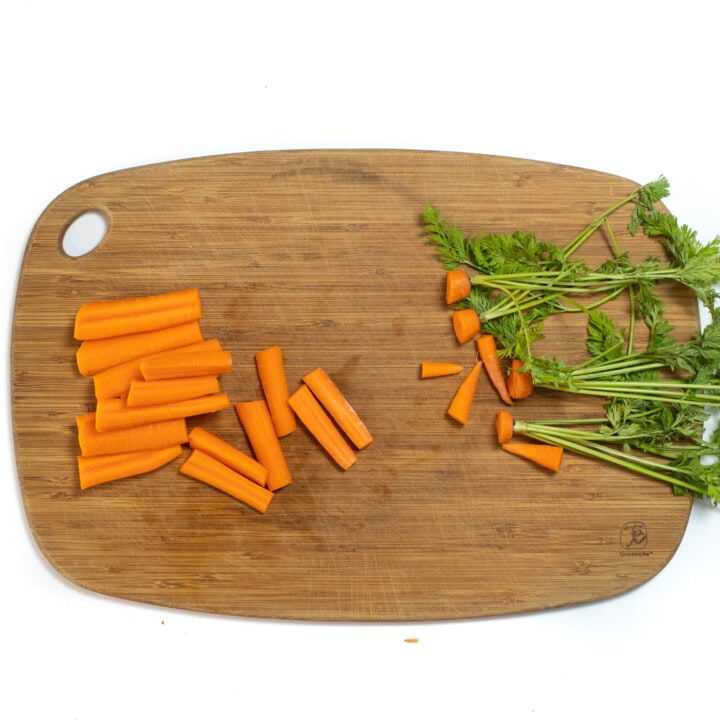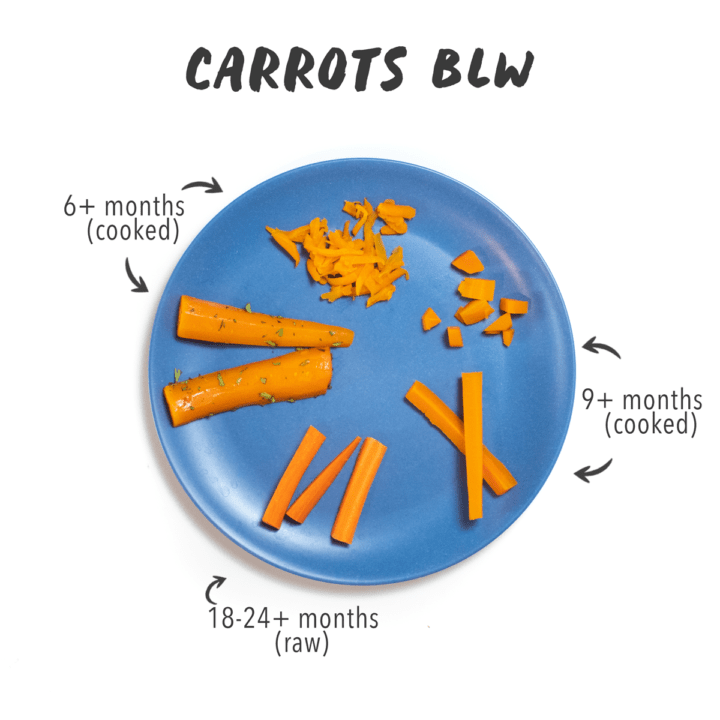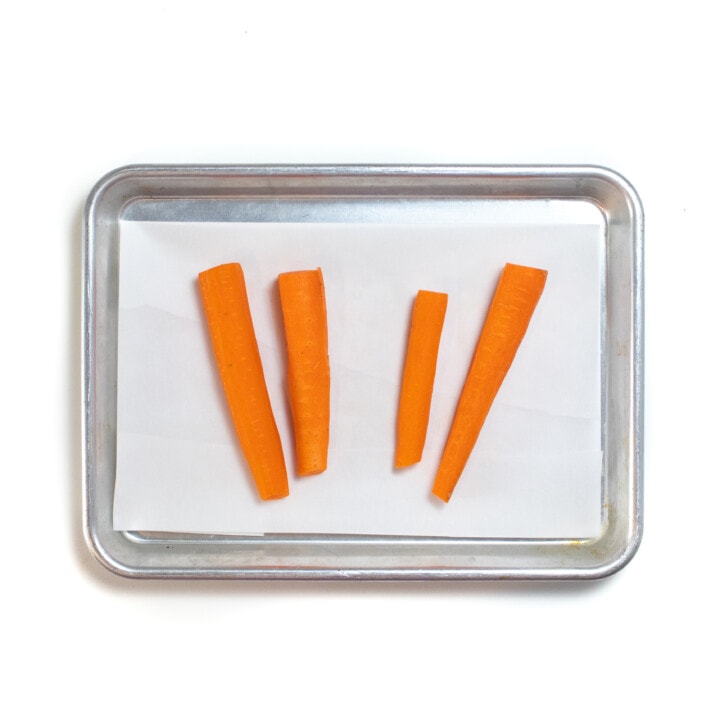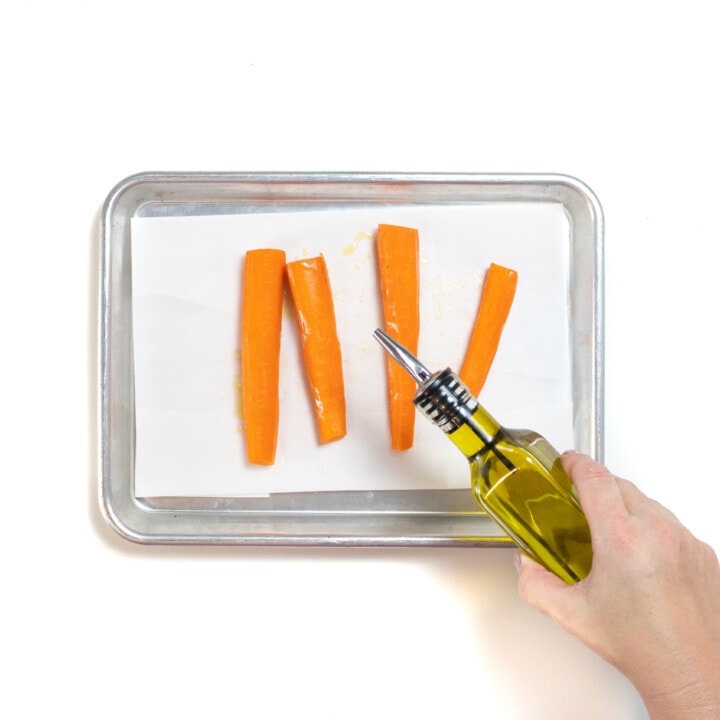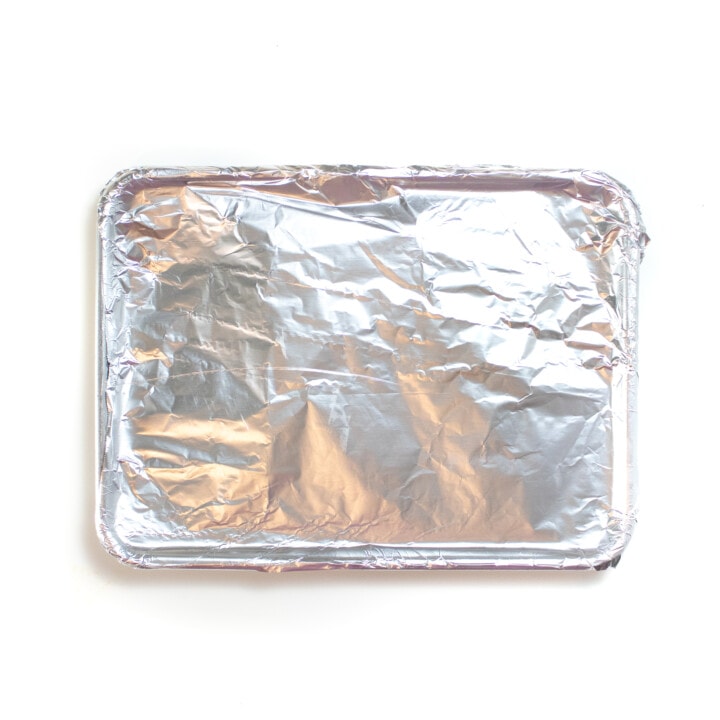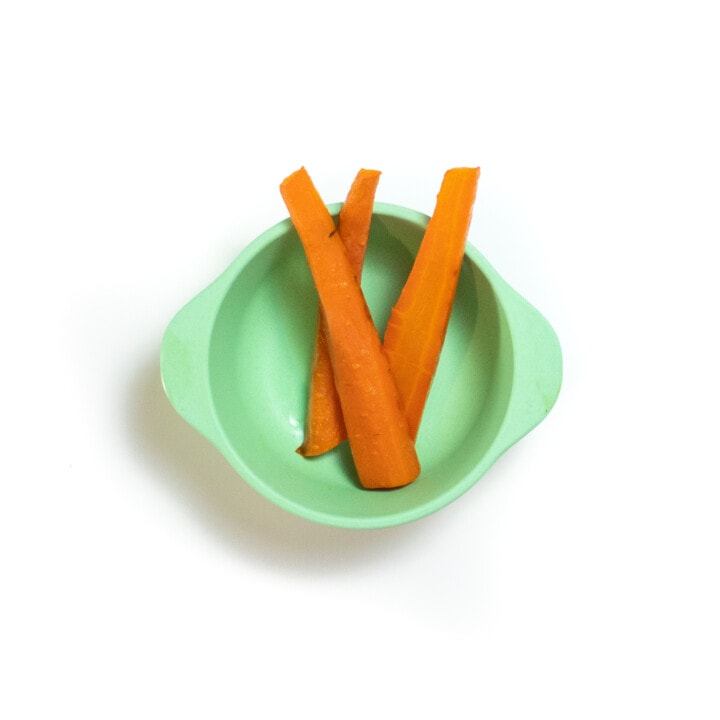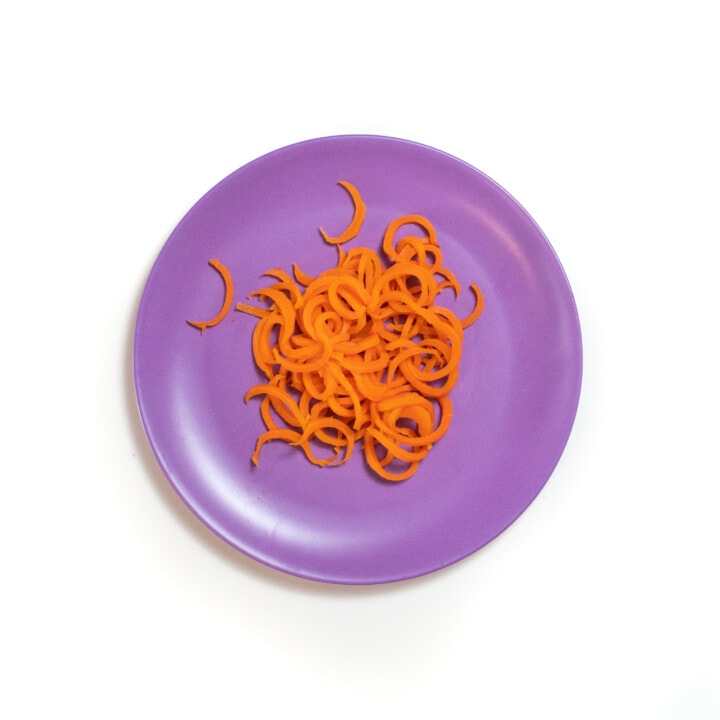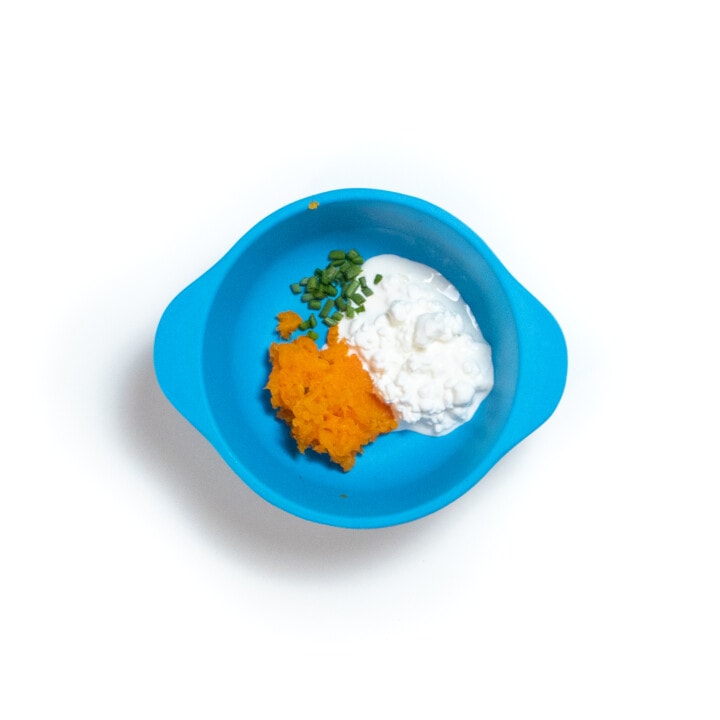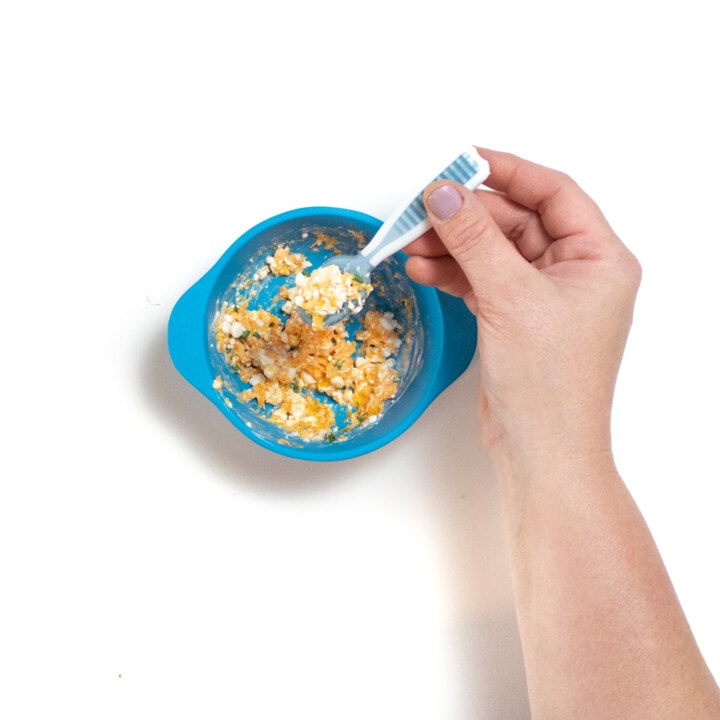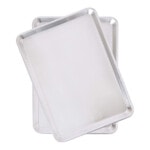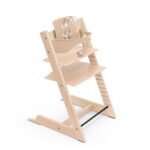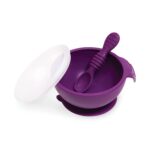Carrots for Baby-Led Weaning
Medically reviewed and cowritten by Jamie Johnson, Registered Dietitian Nutritionist (RDN), and Lauren Braaten, Pediatric Occupational Therapist (OT).
These delicious Carrot Recipes for Baby-Led Weaning are the perfect finger foods for your baby! These 4 recipes are healthy, easy to make, and great to serve to your baby for baby-led weaning at 6+ months or as finger food at 9+ months.
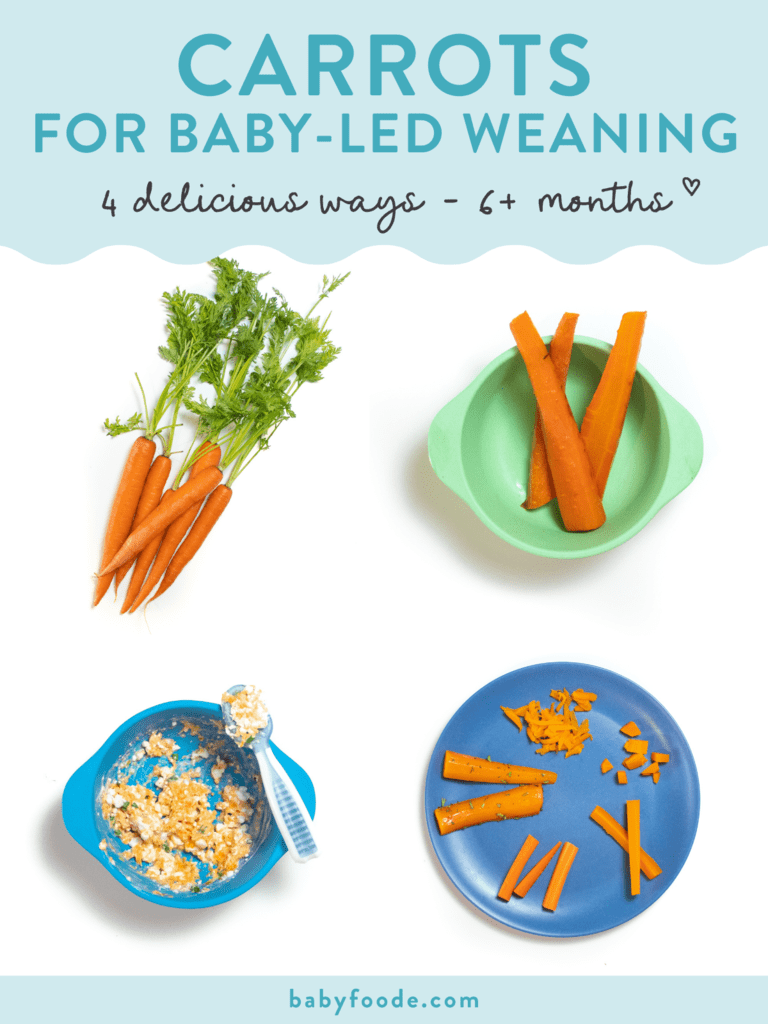
Carrots for Baby-Led Weaning
Looking to serve carrots to your baby, but not sure how?
Then this complete guide on carrots for baby-led weaning is for you!
Below you will find everything you need to know on how to cook and serve carrots to your little one – the benefits of carrots, how to serve them to your baby for baby-led weaning, how to store these recipes, FAQs and so much more!
First time making homemade baby food? Then, I would suggest that you start by reading my very in-depth Complete Guide to Baby-Led Weaning. You can also check out my best-selling cookbook for even more information and recipes!
Carrots for Baby-Led Weaning Video
Watch this video to see how easy it is to make and serve carrots to your baby!
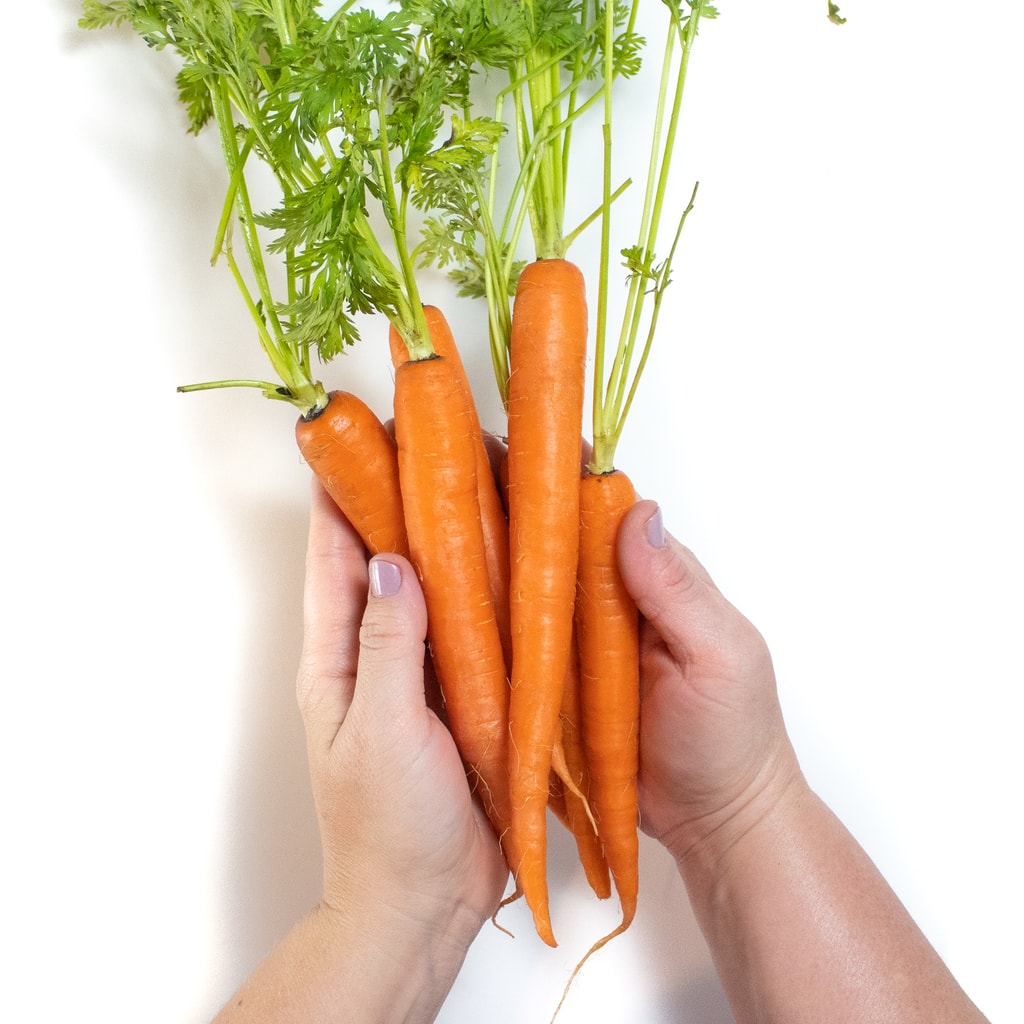
Reason to Love Carrots for BLW
- great for baby-led weaning – 6+ months
- also great for the finger food stage – 9+ months
- full of essential nutrients for baby
- different ways for baby to self-feed
- easy to make
Health Benefits of Carrots
Carrots are full of essential vitamins and minerals for your baby.
- They contain a ton of beta-carotene, the precursor to vitamin A, which is necessary for protecting eye health and immune function.
- High source of antioxidants to help strengthen immunity
- Good source of fiber, which helps keep the digestive system working properly
- High in vitamin K, which is necessary for blood clotting
- Contains calcium to help strengthen bones
Best Carrots to Use
While the standard orange carrot is widely available and at a very reasonable price, you can use any of the 40 different carrot varieties if you can find them in your area or grow them.
Here are some great options:
- Indigo
- Sunlite
- Creme de Lite
- Inca
- Navajo
Spices to Add
Adding spices to your baby’s foods is a great way to introduce more complex flavors at an early age. Some great spices and herbs to add to cooked carrots are a pinch of cinnamon, cloves, mild curry, garlic powder, and cumin or you can add in a pinch of chopped fresh rosemary, chives, mint, basil or you can even add in the greens from the carrots.
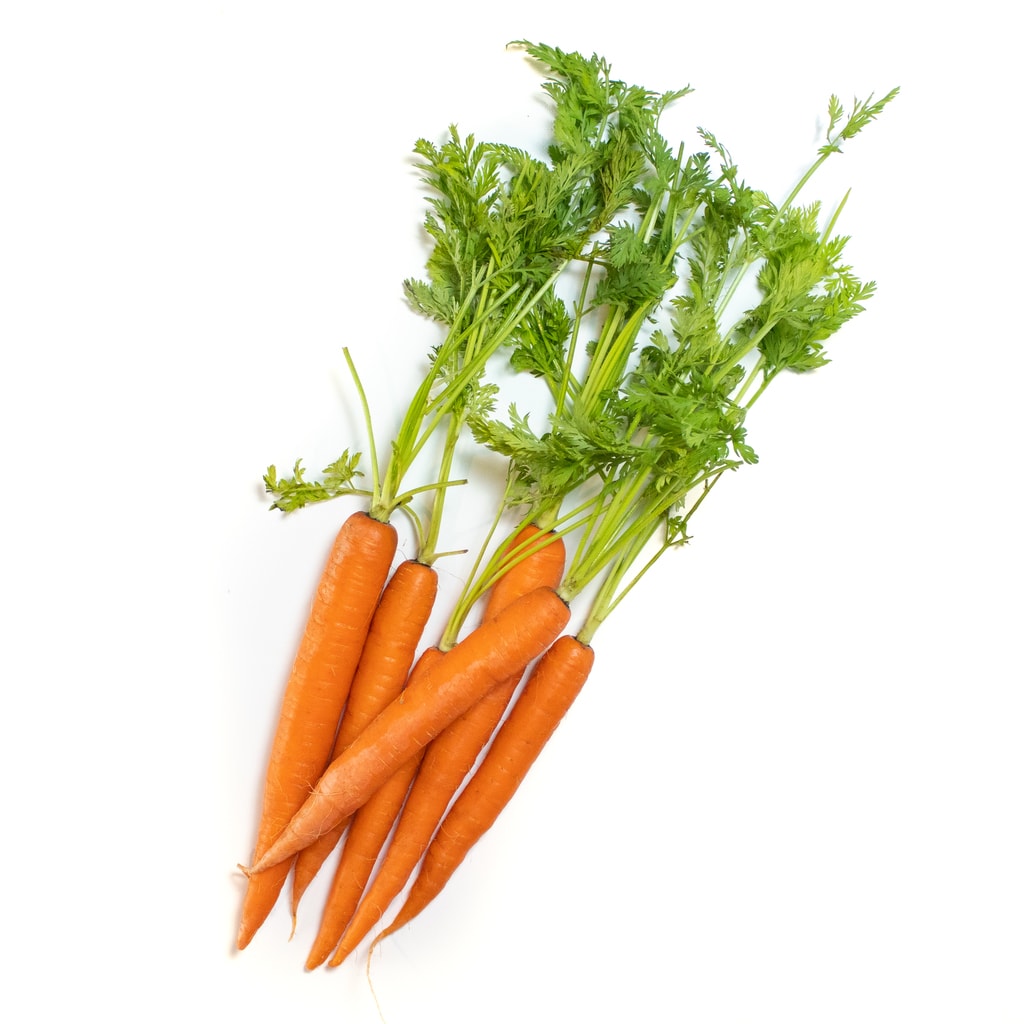
Frequently Asked Questions
Carrots can 100% be your baby’s first food if you want it to be. It is recommended to wait to introduce the top eight allergen foods to your baby once a few other well-tolerated foods have been introduced, but otherwise foods can be introduced in any order so choose whatever you are most excited for your baby to have.
No, carrots are not a common allergen, however, as with any food, start with a small portion and be aware of any signs that might be an allergic reaction after introducing it.
Steamed carrots, though unlikely, may cause constipation in some babies, so avoid giving too much.
Yes, raw carrots can be a choking hazard for babies and children. For safe ways to prepare carrots for your baby, see my recommended recipes below, and always be near baby or toddler when they are eating.
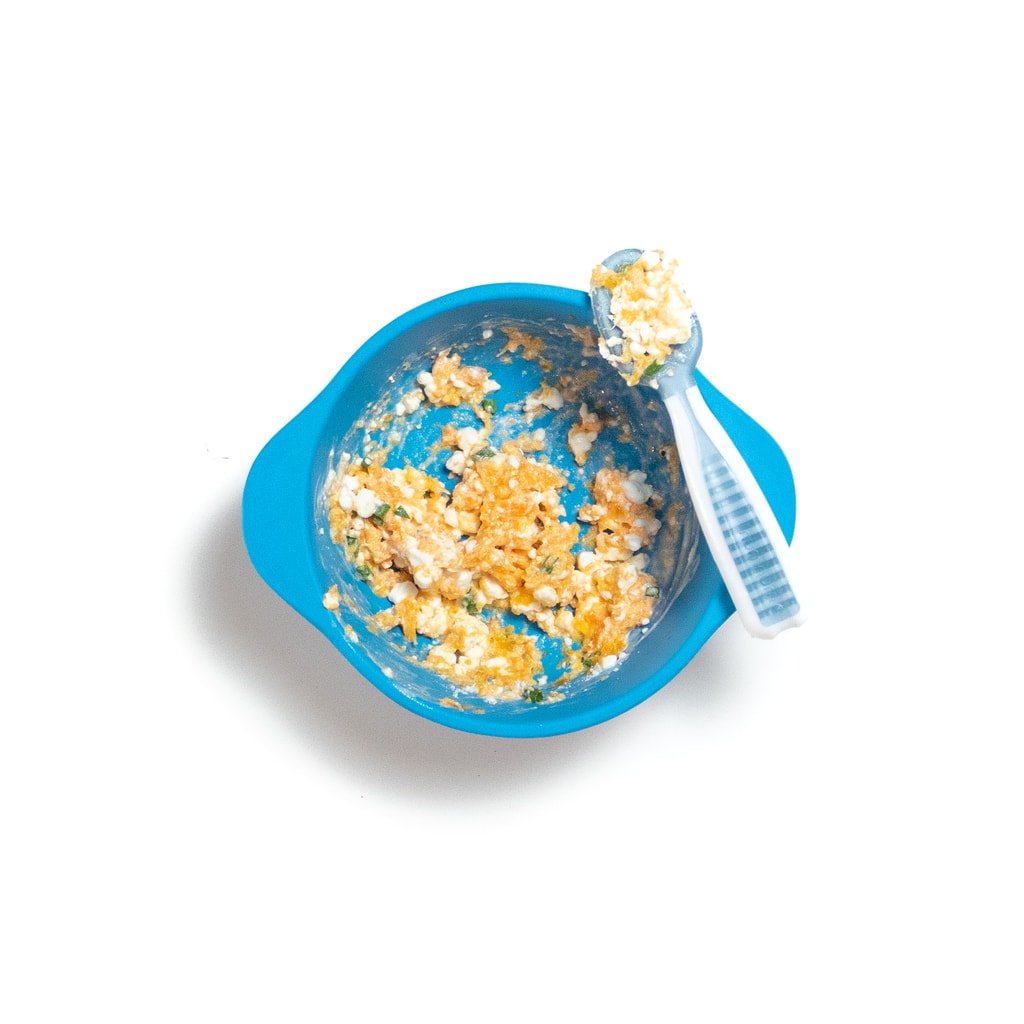
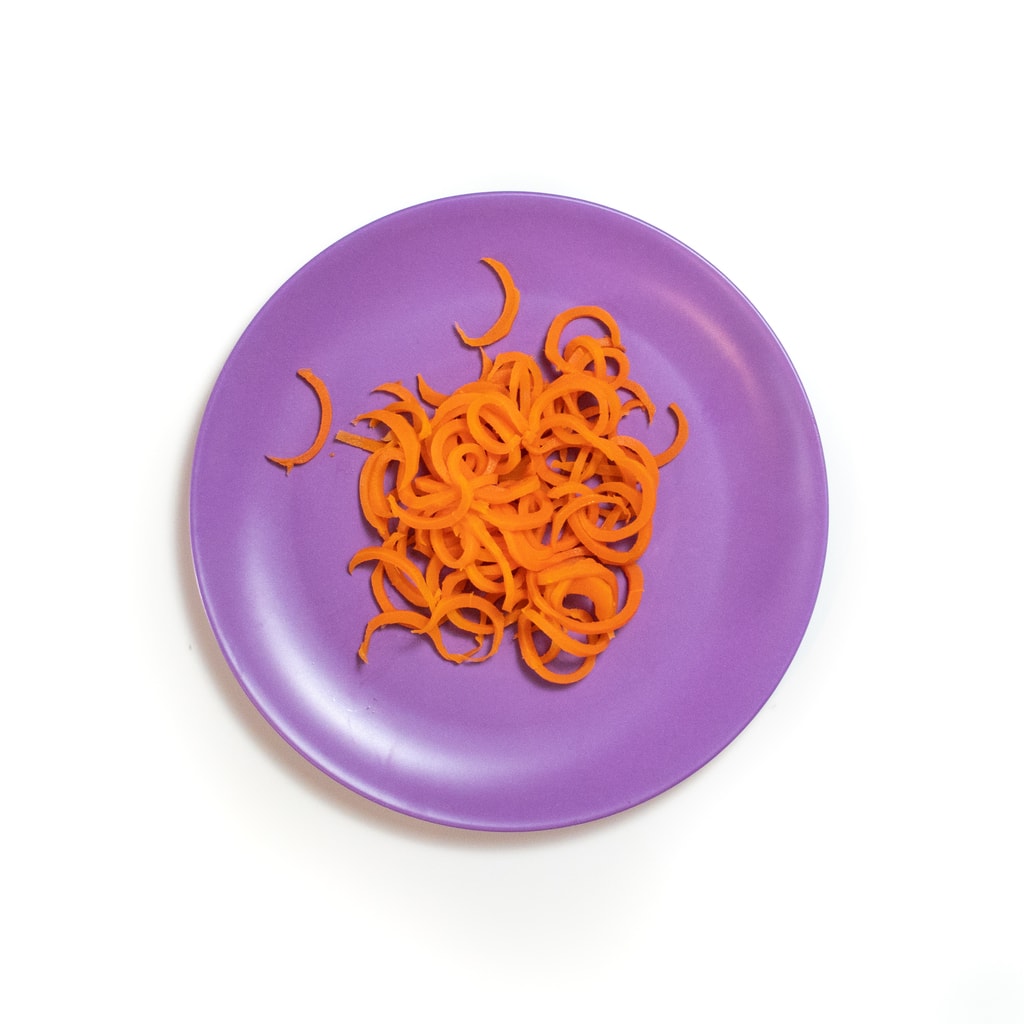
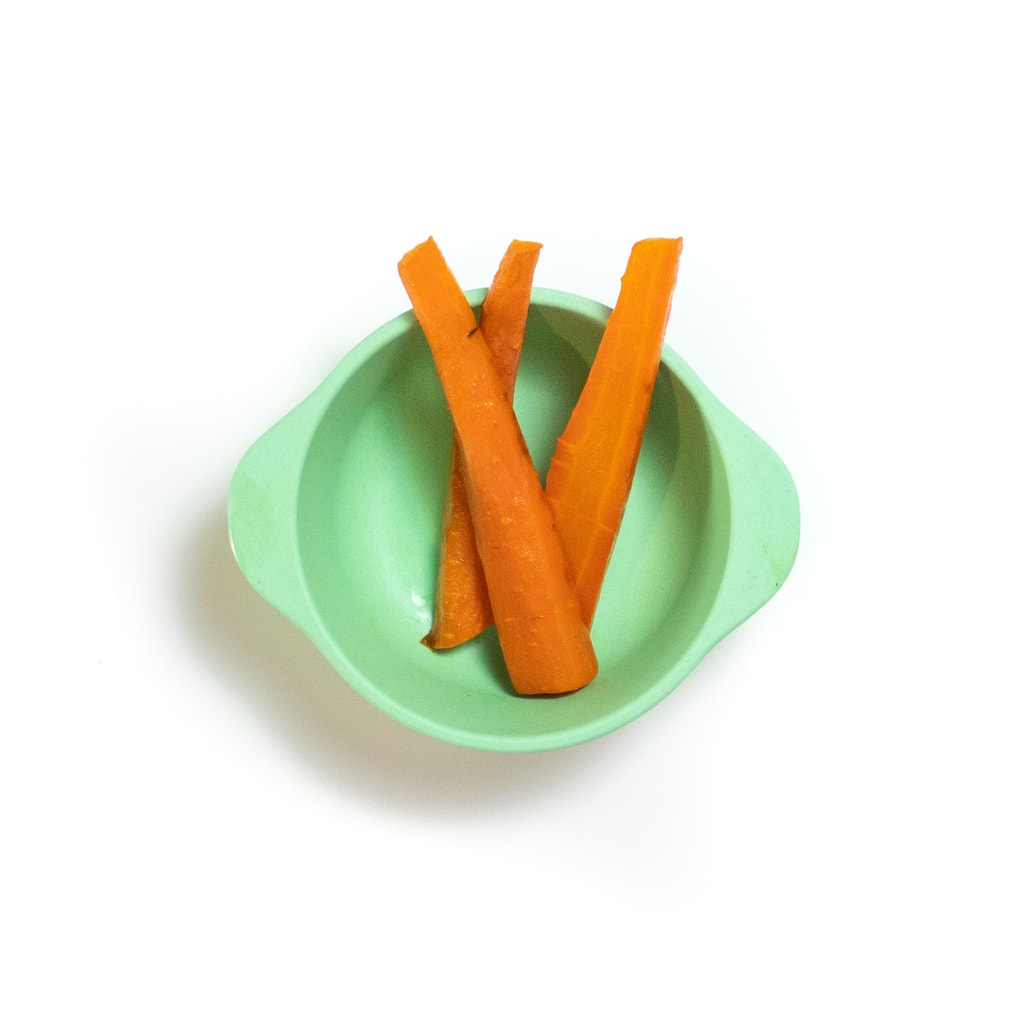
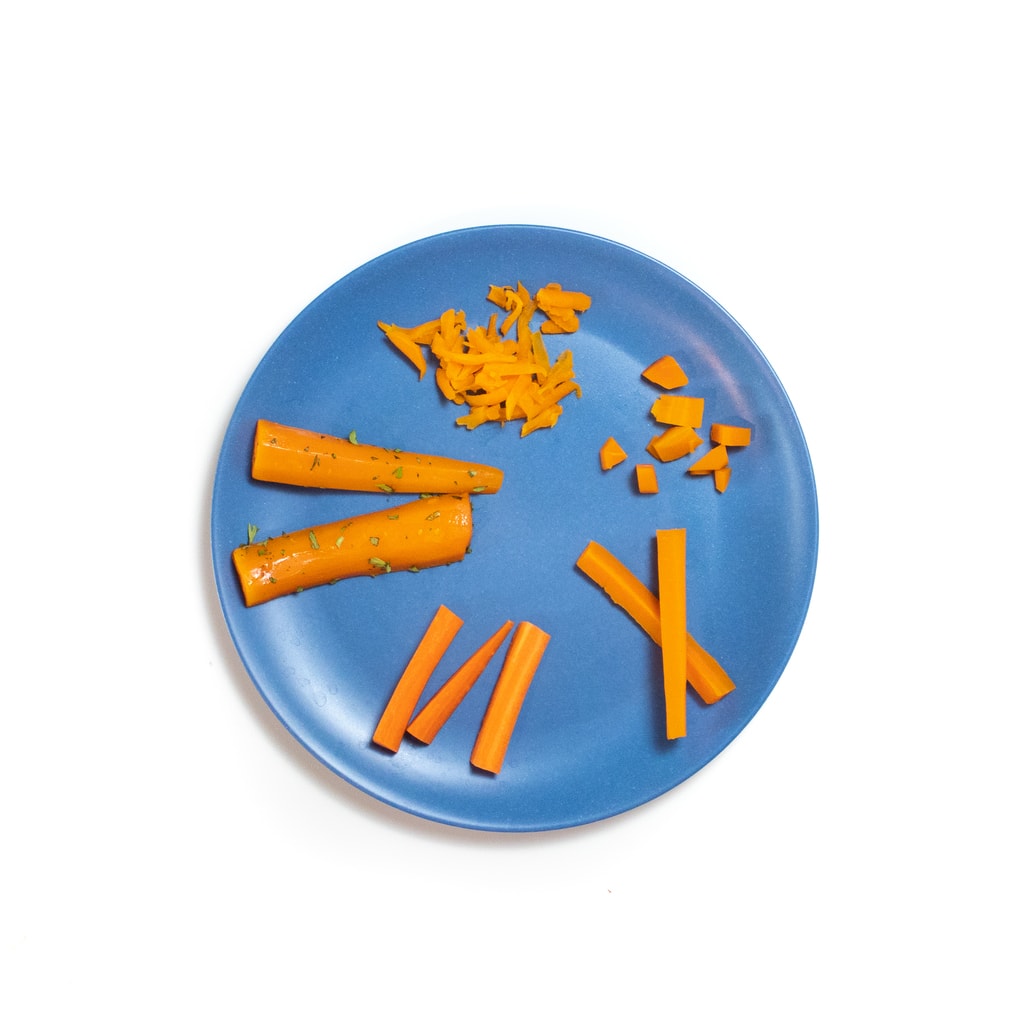
How to Prepare Carrots for Baby-Led Weaning
There are several different ways to prepare carrots for your baby. Here are some of my favorite ways:
- Steamed
- Grated
- Roasted
- Boiled
- Spiralized
- Mashed Carrots with Ricotta and Chives
The goal is to cook the carrots until they are soft enough for your baby to eat (or gnaw on) yet still firm enough for your baby to pick and self-feed. For babies 6 months and up using their palmar grasp, you can serve cooked carrots in long strips or for babies using their pincer grasp you can serve them carrots grated, spiralized or cooked carrots mashed and served to your baby on a self-feeding spoon. While it is completely safe to serve your baby cooked and grated carrots at 6 months, most babies are still working on their pincer grasp, and picking up tiny pieces of carrots may be frustrating for some babies.
Carrot Puree: You can offer purees and still allow your baby to lead the way with self-feeding by offering thee puree on a self-feeding spoon, by placing a few spoonfuls of the puree directly on the tray or in a bowl for your baby to dip their fingers into, or you can even use the puree as a dip for solid foods such a banana or piece of toast.
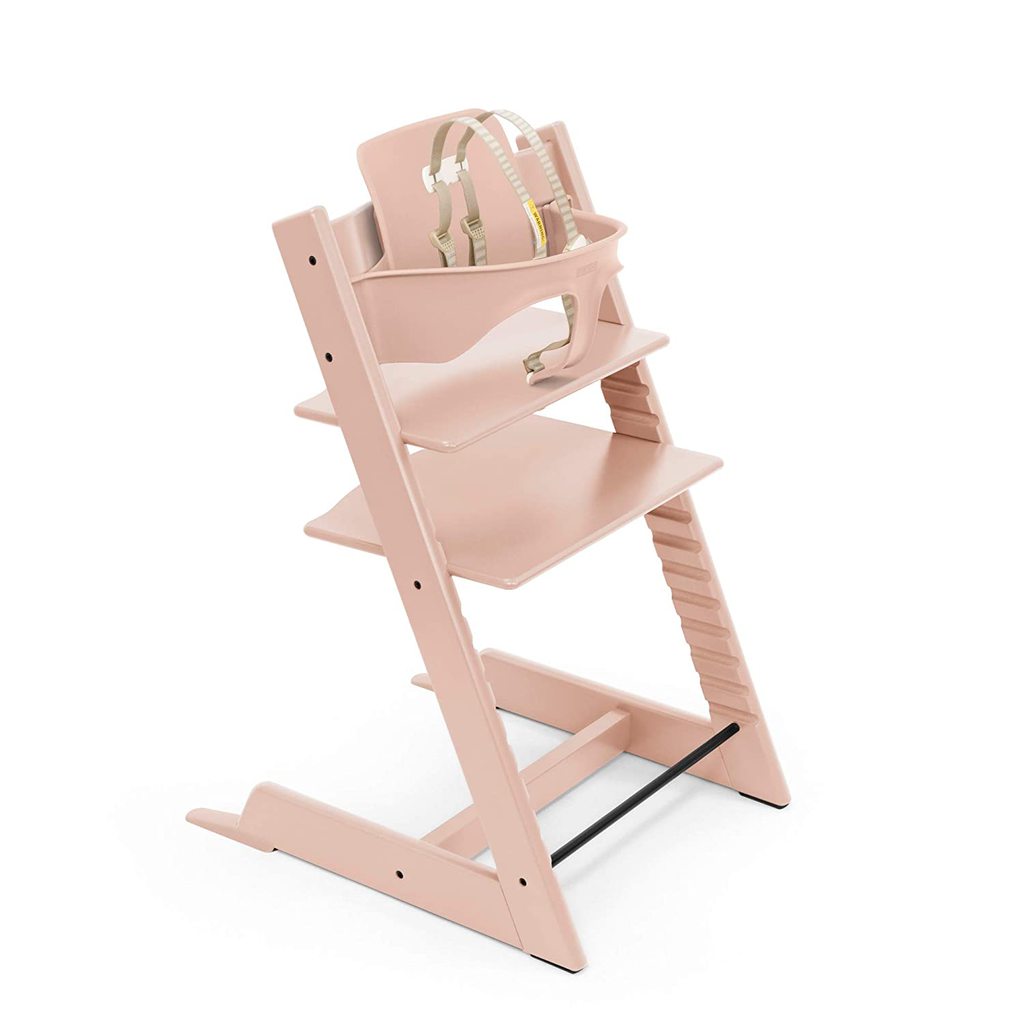
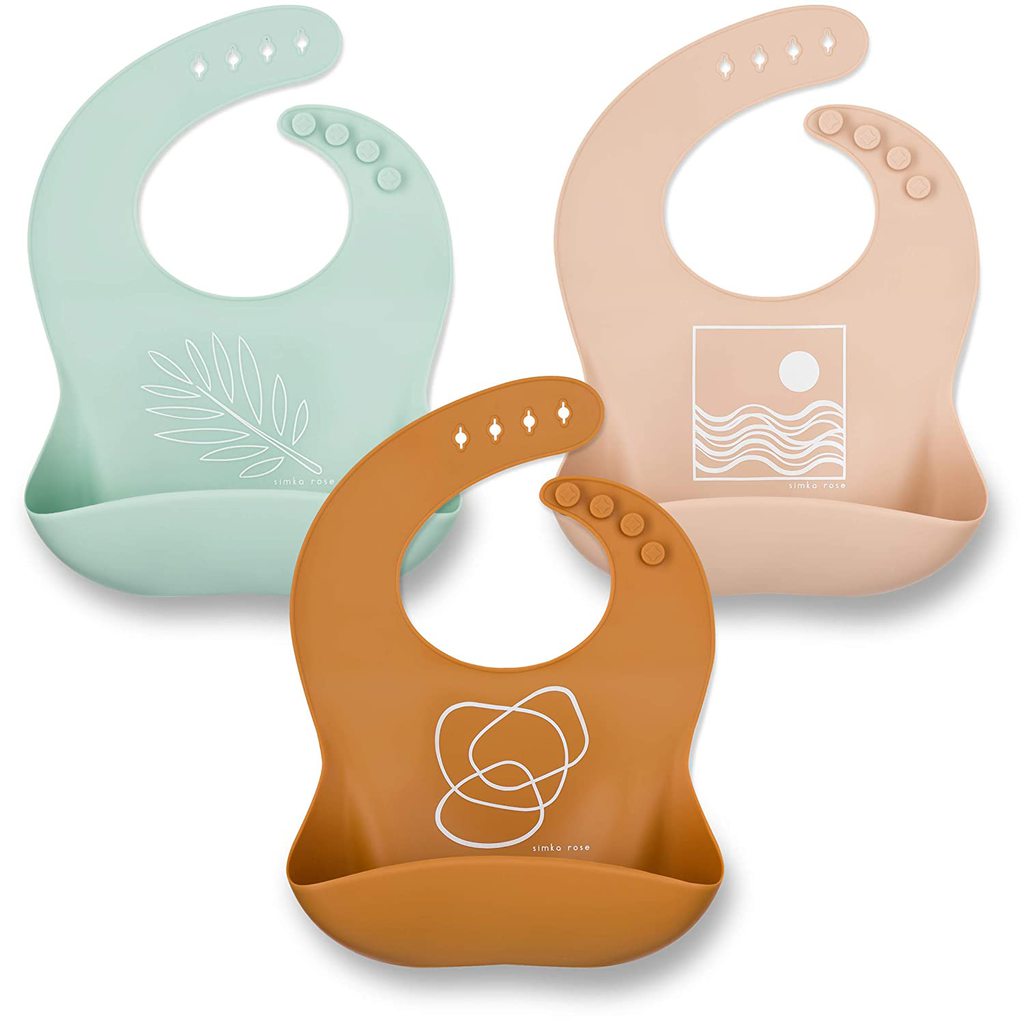
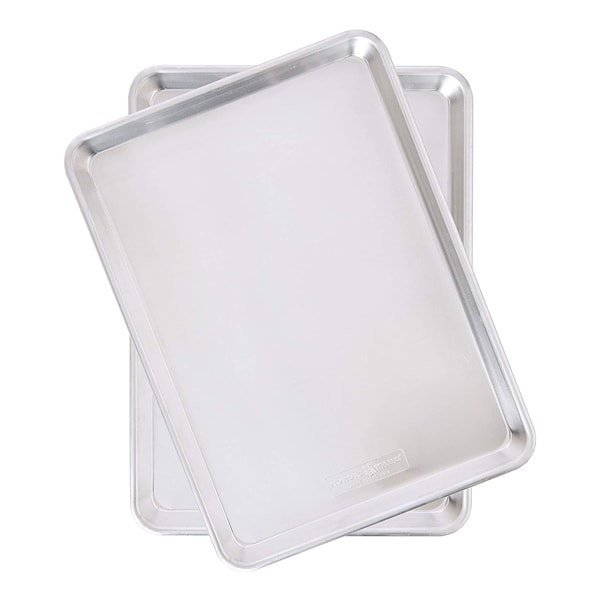
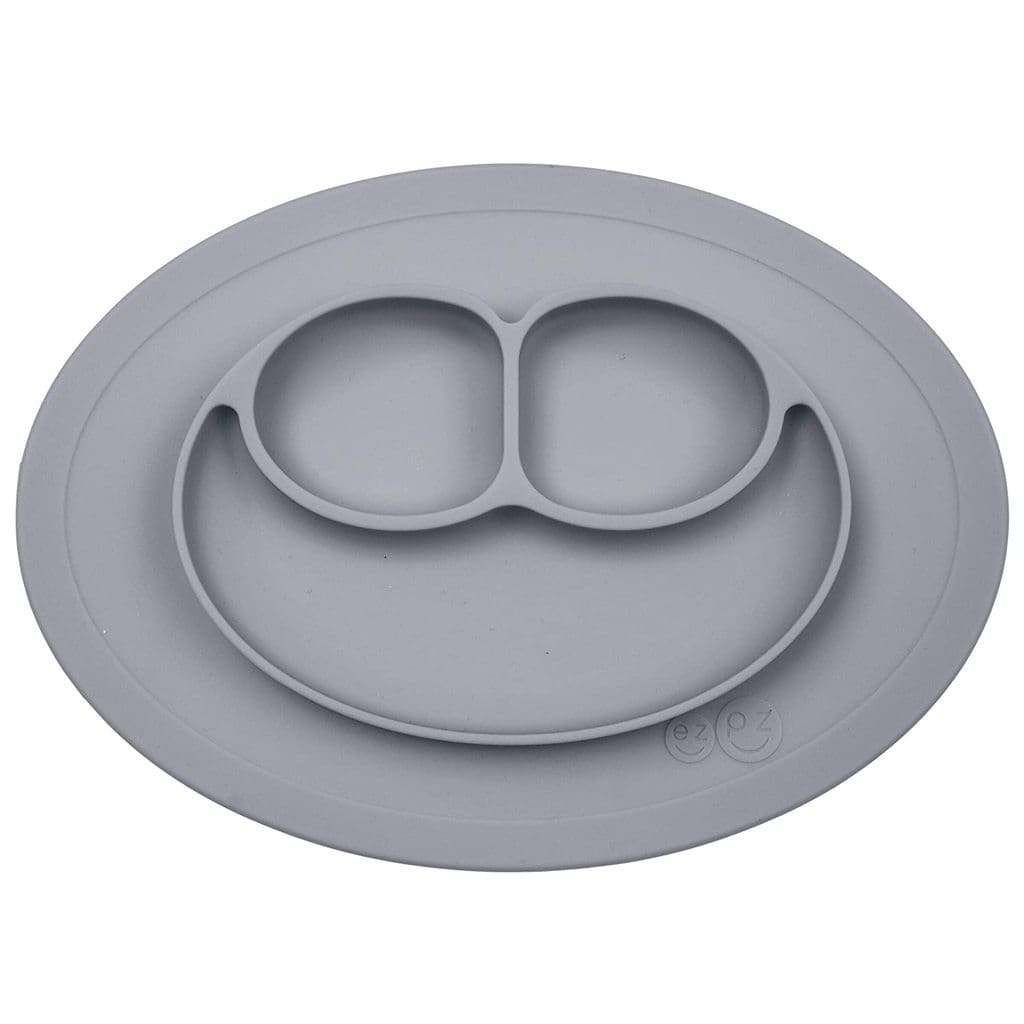
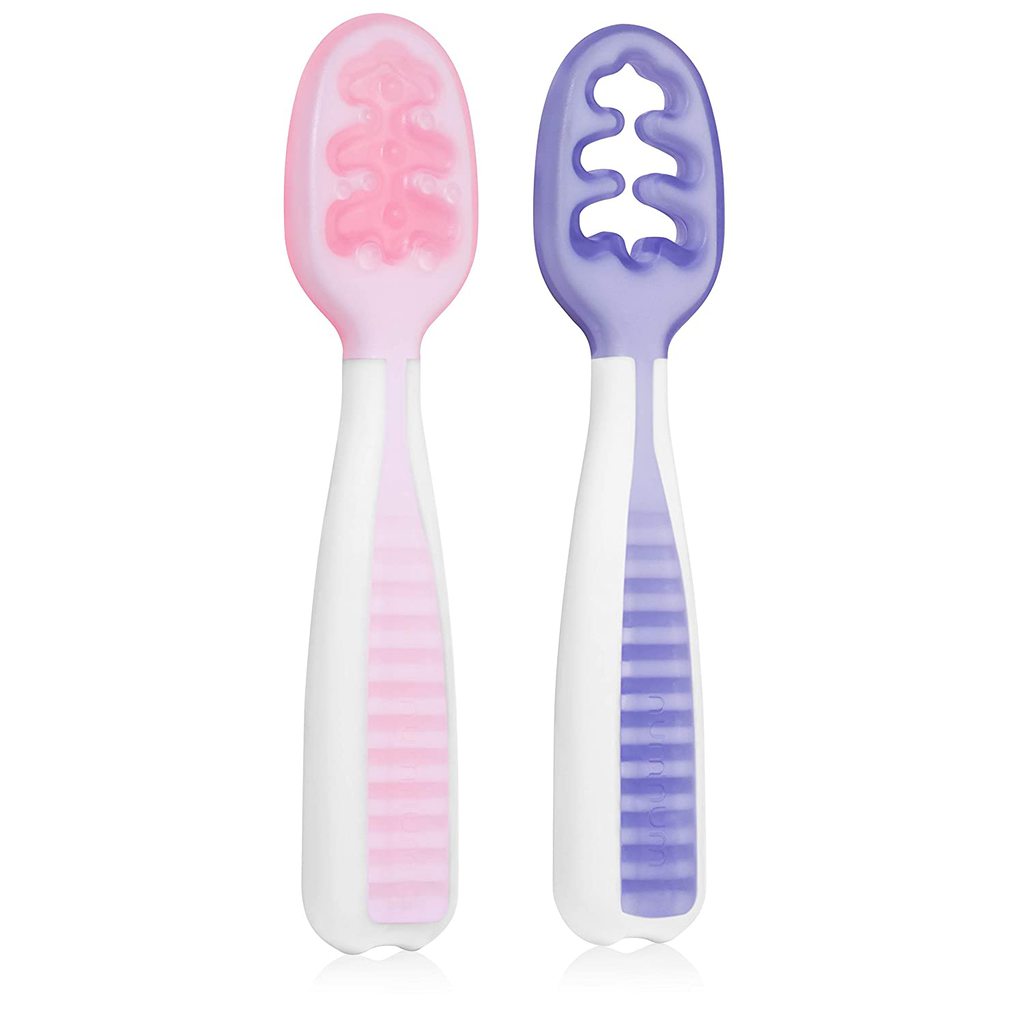

Helpful Tools for Baby-Led Weaning
Here are some products that help you make and serve carrots to baby even easier! To find even more products that I love, make sure to check out my online shop.
- highchair
- baking sheet
- easy to hold fork and spoon
- GOOtensils
- bowl or sectioned plate
- open lid cup
- bib with catch pocket
- sleeved bib
- splat mat to cover the floor
Baby-Led Weaning Feeding Tips
- Watch for signs that your baby is ready to start solid foods, usually around 6 months of age. Look for sitting with minimal assistance, good control of their head and trunk, bringing hands and toys to their mouth, and appearing interested in what you are eating.
- Understand the difference between gagging and choking – including the signs of each and how to respond.
- Serve and cut foods to help with grasp and minimize frustration – cut food into 2-3′ strips or sticks (about the size of 2 adult fingers) for babies 6-9 months old. You can shred or cut foods into pea sized pieces once baby reaches 9-12 months old to promote fine motor grasp.
- Have a plan for making clean-up easier, such as bibs that double as “food catchers,” a large mat underneath the highchair, a good vacuum, or a helpful dog! It might feel tempting to do so, but hold off on wiping your baby’s face and hands until the end of the meal. You might even consider taking your baby to the sink and letting them rinse their hands and face there afterward.
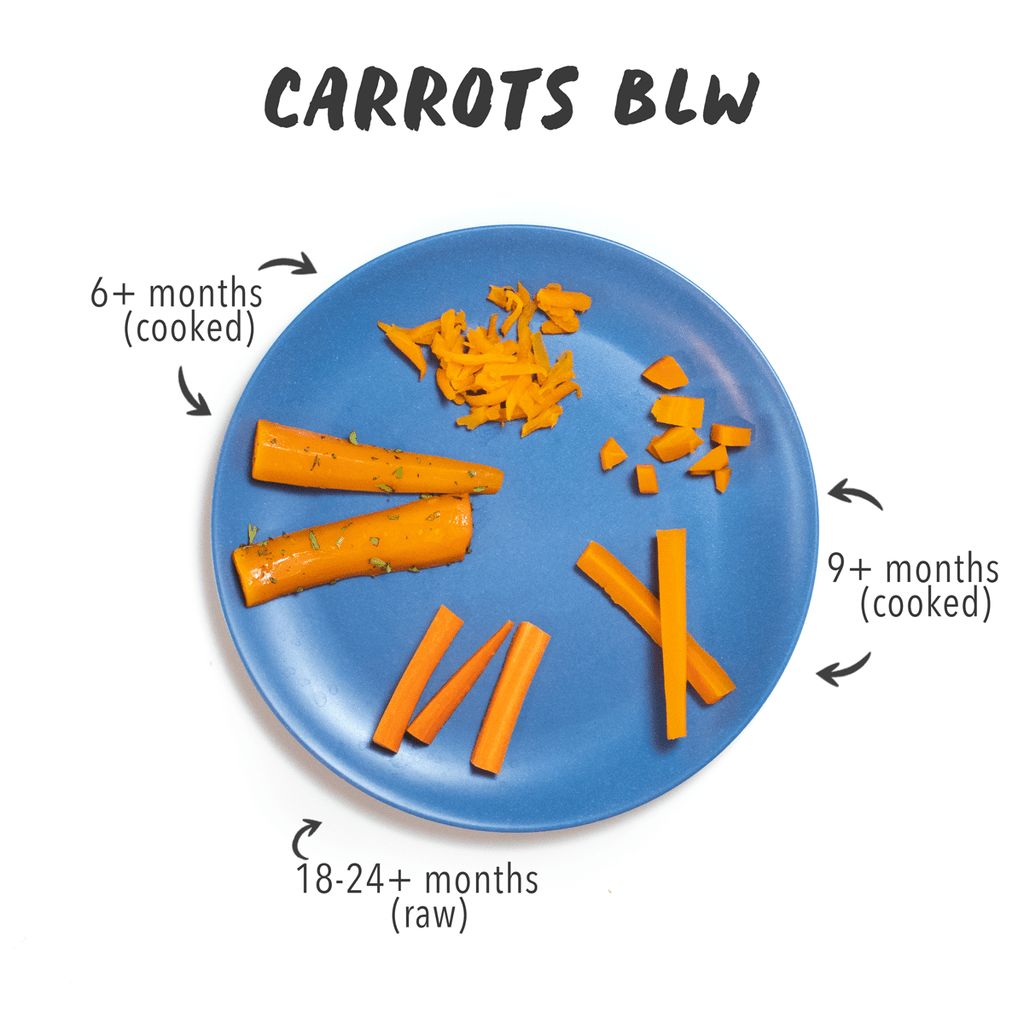
How to Serve Carrots for Baby-Led Weaning
Carrots can be a choking hazard for your baby, regardless if you are doing baby-led weaning starting at 6 months or during the finger foods stage at 9 months, so it is important to cook and serve them properly.
Quartered in Long Sticks (6+ months): cooked carrots that are bigger in size, usually quartered and 4-5 inches is best to serve to babies 6+ months or just starting on solid foods. It’s best to start your baby with a bigger piece of cooked carrots so your baby can chew, gnaw and take bites without them being a choking hazard.
Grated (6+ months): while it is perfectly safe to serve your baby cooked carrots that have been grated, most babies are still working on their pincer grasp, and picking up tiny pieces of carrots may be frustrating for some babies.
2-3 Inch Sticks (9+ months): you can serve baby smaller cooked carrots, 2-3 inch sticks, around 9 months of age.
Chopped into Small Pieces (9+ months): smaller ‘pea’ size pieces of cooked carrots can be served to your baby around 9 months of age so they can start working on the pincer grasp.
Raw (18-24 months): uncooked or raw quartered carrots can be served to toddlers while being supervised.
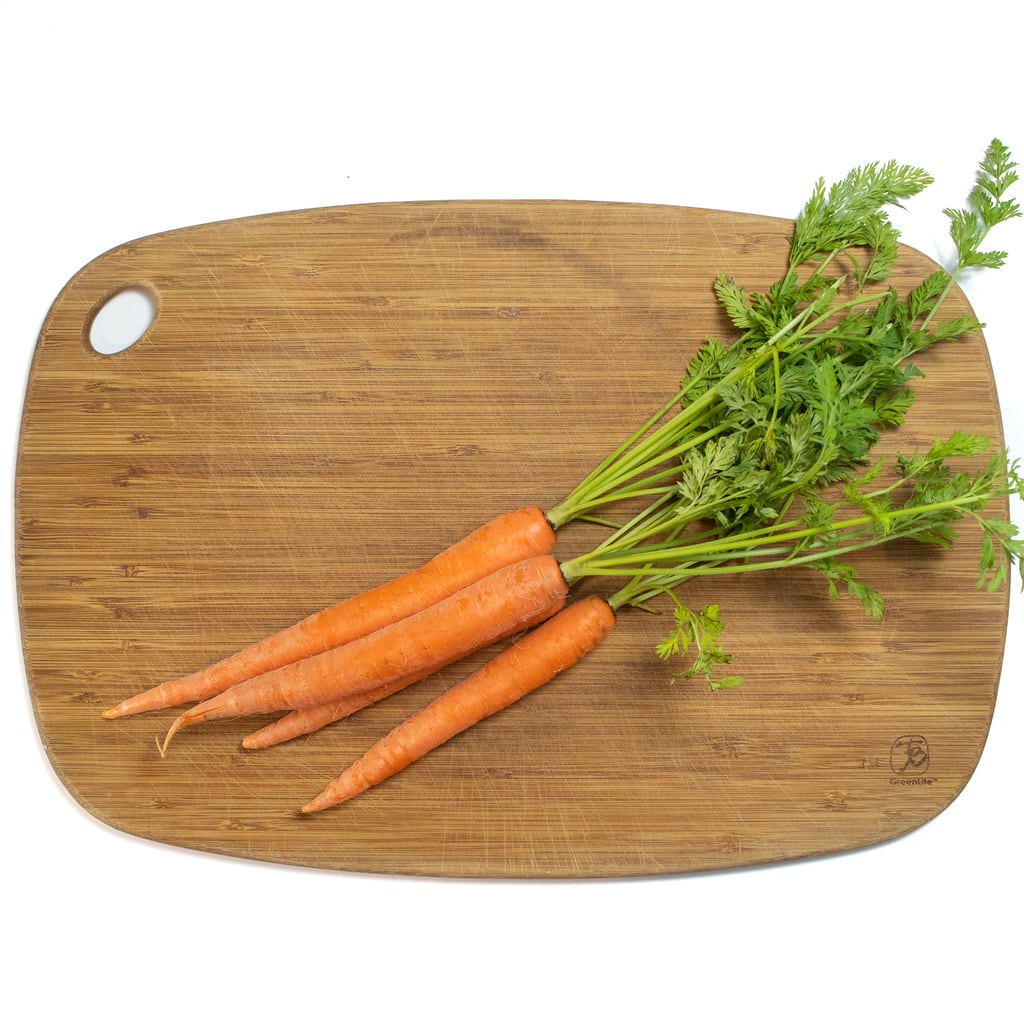
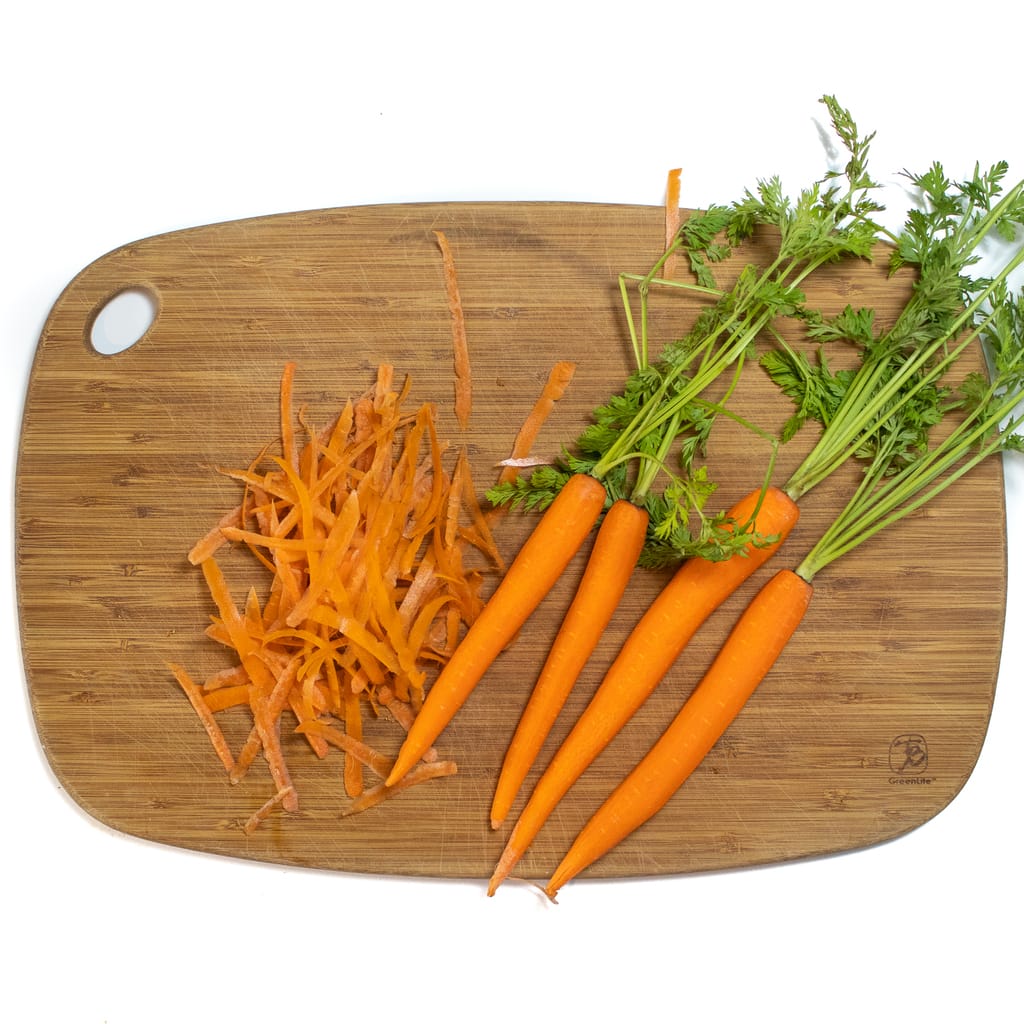
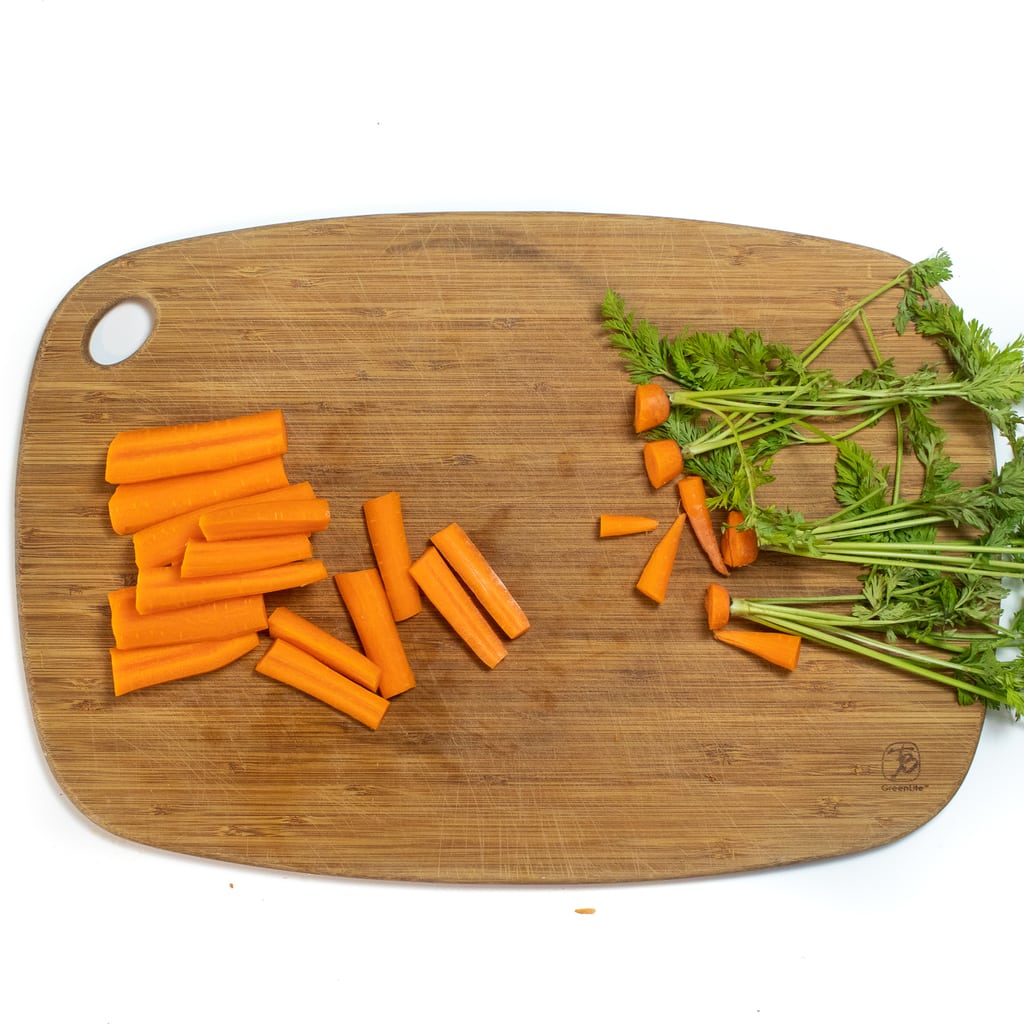

Steamed Carrots with Carrot Greens
Steamed carrot halves or quarters are a fast and simple way to serve carrots to your baby or toddler. You can toss the fork-tender carrots with a drizzle of olive oil and add a pinch of your favorite spice or herb (see recommendations below).
To make (get the full recipe below): peel and cut carrots in half or quarters and steam until soft. Let cool. If you want, you can toss the carrots with a little olive oil or butter and then add in a pinch of chopped carrot greens.
Grated Carrots
Grated carrots are a great way to vary the way you serve carrots to your baby. While your baby can have grated carrots at 6 months of age, it’s easier for your baby to pick them up around 9 months once their pincer grasp starts developing. You can also add grated carrots to greek yogurt, ricotta, or cottage cheese and serve to your baby in a bowl to eat with their hands or you can load it onto a baby-led weaning spoon for them.
To make (get the full recipe below): gently steam whole carrots, let cool and then grate.
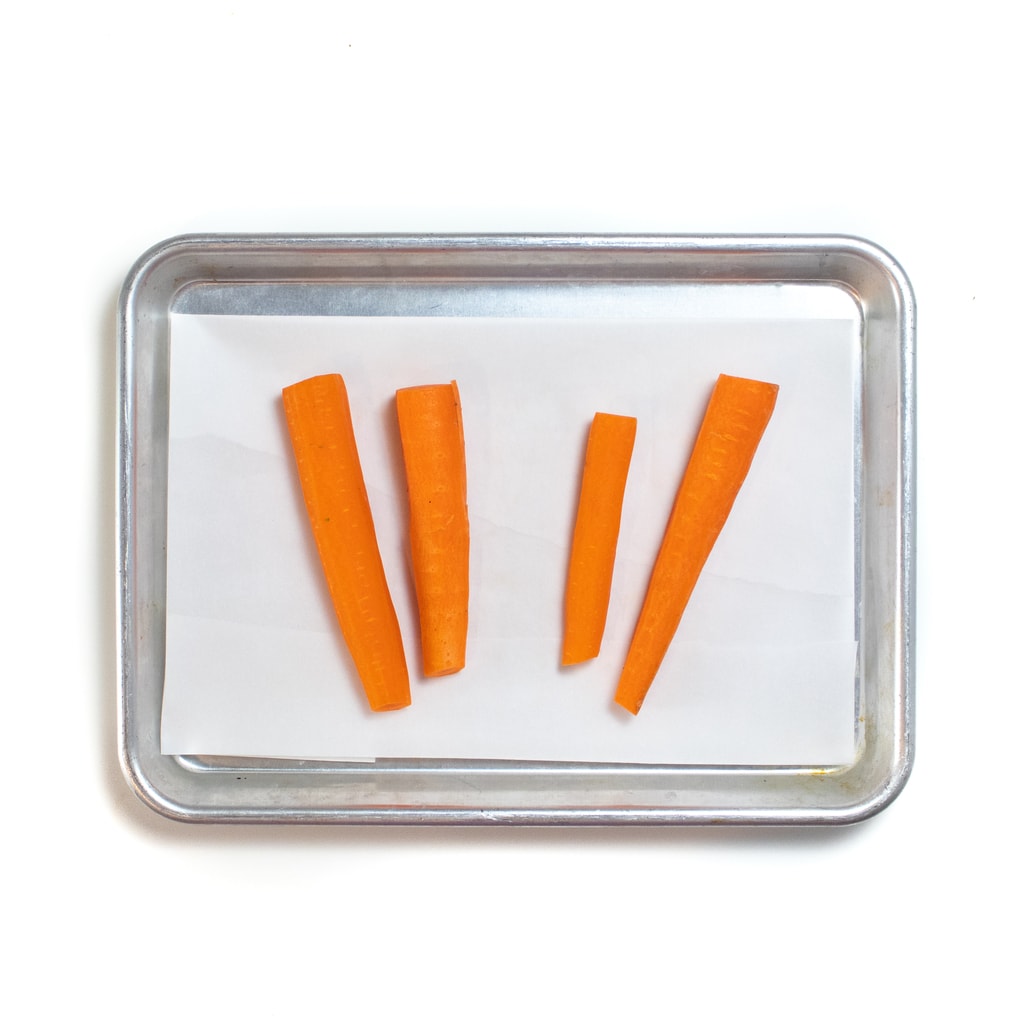
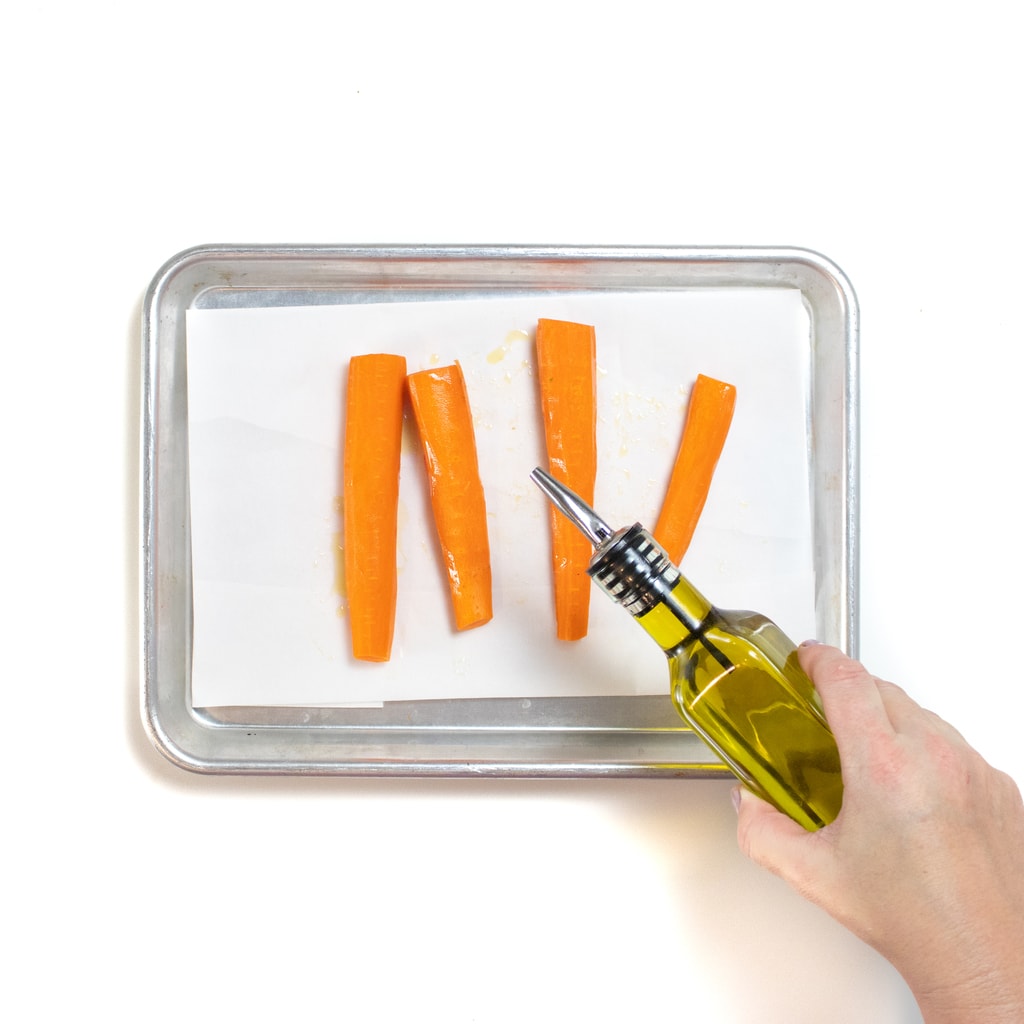
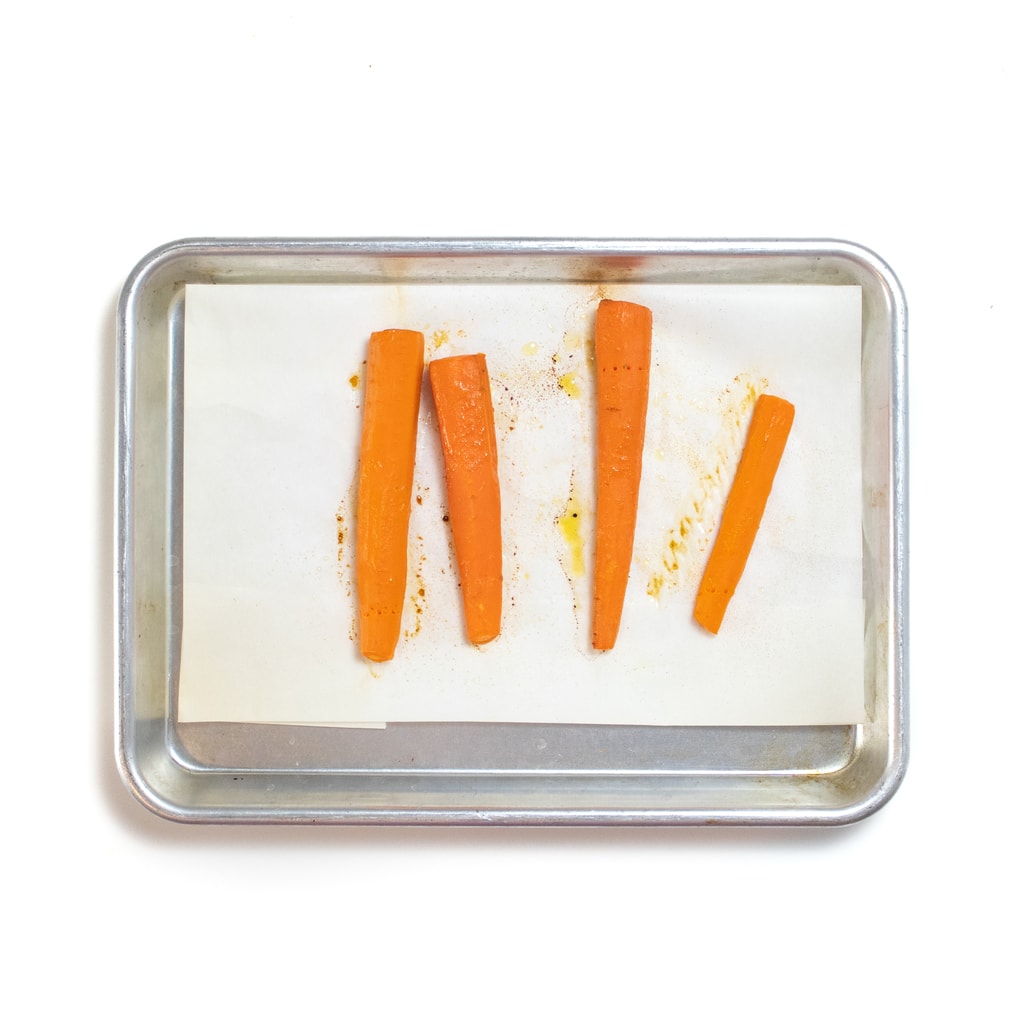
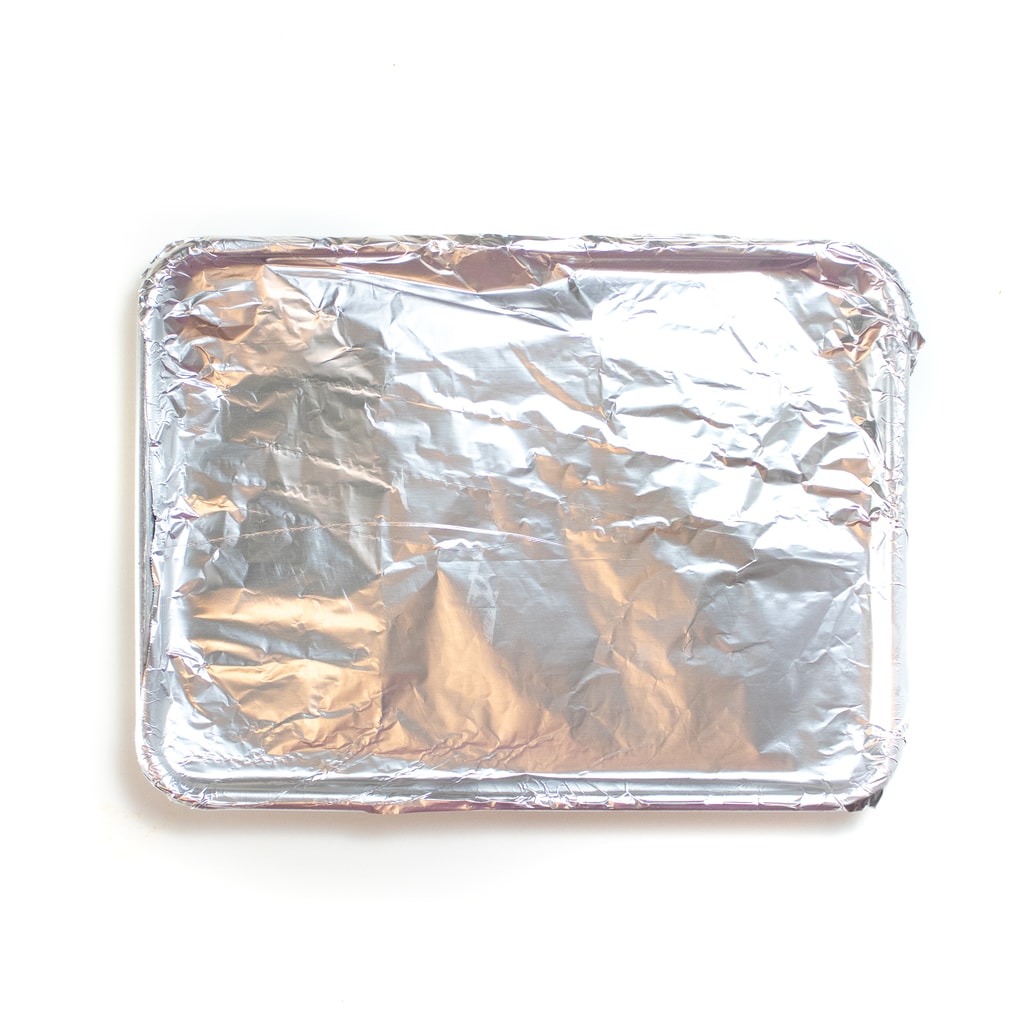

Steam Roasted Carrots
While you can serve baby roasted carrots, I really love to use a technique called steam roasting for younger babies, as sometimes the roasted brown parts of the carrots can get too hard for your baby. To steam roast carrots, you will place halved carrots on a baking sheet before covering the baking sheet in tinfoil. The tinfoil will trap the moisture from the carrots which will keep them soft.
To make (get the full recipe below): peel and cut carrots in half. Drizzle the carrots in a little olive oil and lay the halves on a baking sheet. Roast for 25-30 minutes, let cool and serve to baby.

Spiralized
If you’re feeling extra, then bust out your spiralizer and turn an ordinary cooked carrot into something extraordinary!
To make (get the full recipe below): gently steam carrots and then spiralize with a spiralizer.
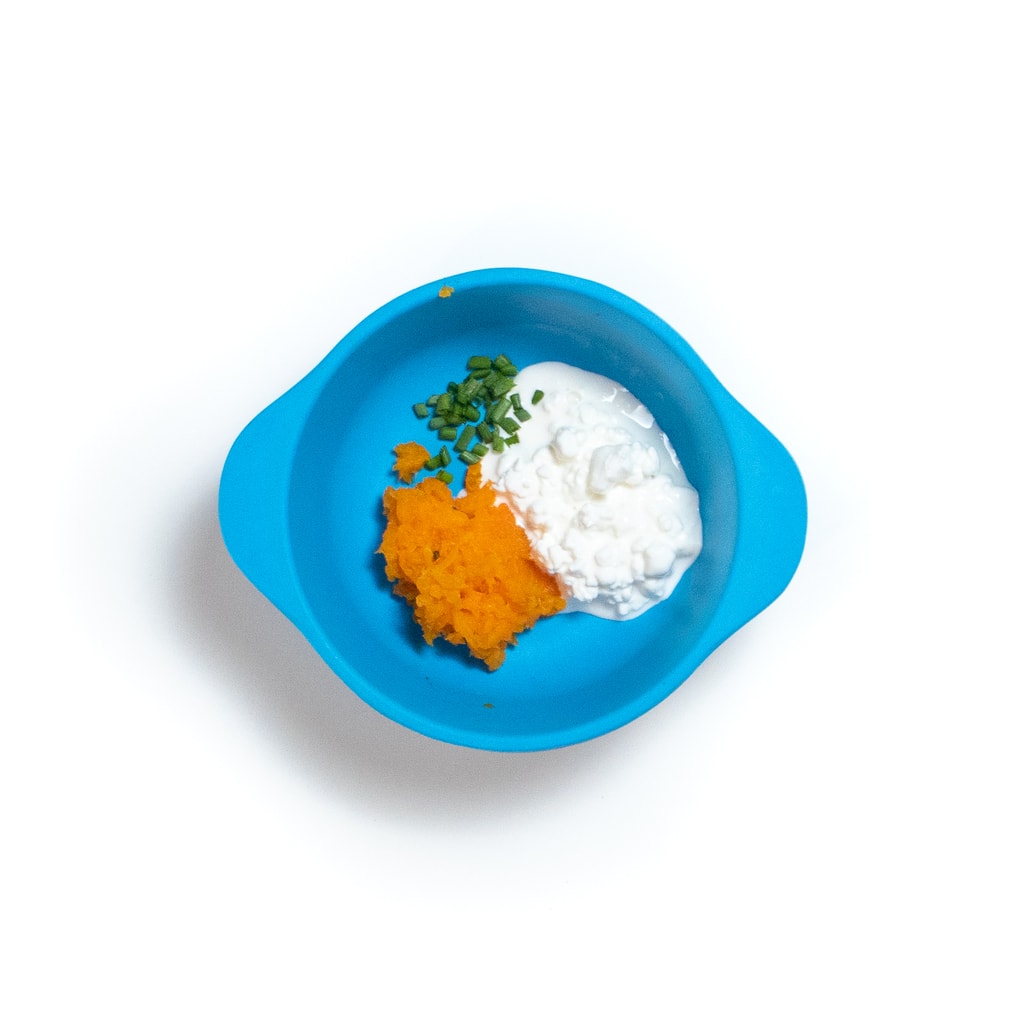

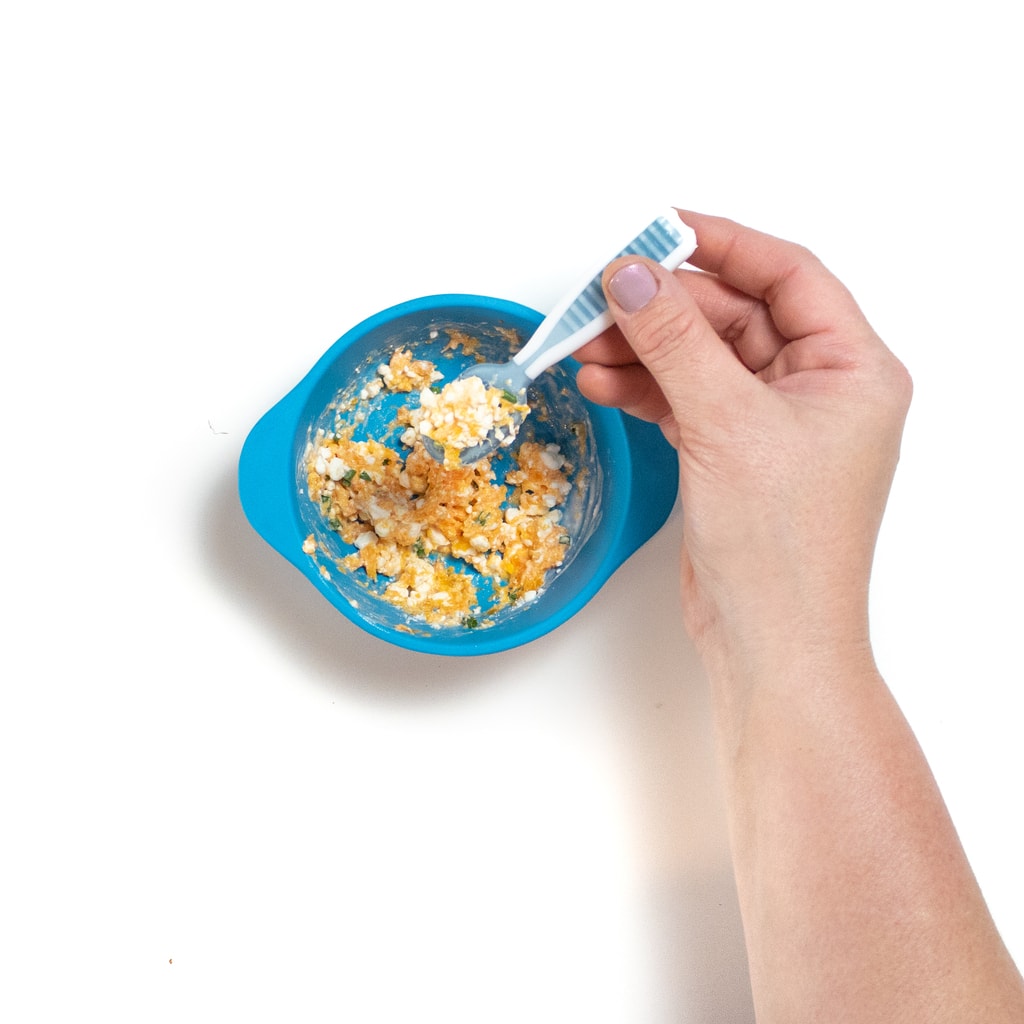
Mashed Carrots with Cottage Cheese and Chives
A fun flavor combination – carrots, cottage cheese and chives! You can serve this mashed meal in a bowl for your baby to eat with their hands or you can load it onto a baby-led weaning spoon for them. You can also mix the mashed carrots with ricotta, plain yogurt or hummus and add in a pinch of your favorite spices or herbs.
To make (get the full recipe below): place a spoon full of whole-fat plain cottage cheese and a pinch of chopped chives in a bowl. Add in some mashed cooked carrots (steamed or roasted work in this recipe) and mix.
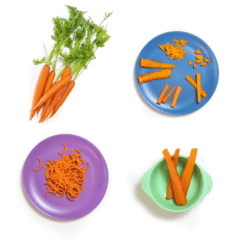
Get the recipe: Carrots for Baby-Led Weaning
Ingredients
Steamed Carrots
- 2-3 carrots, peeled and sliced in half lengthwise
- 1 tbs olive or avocado oil (optional)
- pinch finely chopped carrot greens, or other fresh herb of choice (optional)
Steam Roasted Carrots
- 2-3 carrots, peeled and sliced in half lengthwise
- 1-2 tsp olive or avocado oil
Spiralized Carrots
- 1-2 large carrots, peeled
Mashed Carrots with Cottage Cheese & Chives
- 1 cooked carrot peeled and either steamed, steam roasted or roasted
- 2 tbsp whole milk plain cottage cheese (or whole milk ricotta, yogurt or plain hummus)
- pinch finely chopped chives
Instructions
Steamed Carrots
- In a medium saucepan, bring 2" of water to a boil over high heat. Add a steamer basket and add the large halves of the carrots into the basket in a single layer. Cover and cook for 10-12 minutes or until tender when pricked with a fork. Remove from heat and let cool.
- If adding spices or herbs, take the carrots and toss in the olive oil and carrot greens (or other spices or herbs of your choice, see below for some other suggestions).
- Slice or chop the carrots to be age-appropriate for your baby. Serve and enjoy.
Steam Roasted Carrots
- Preheat oven to 425°F. Line a baking sheet with parchment paper, silicon mat or spray with cooking spray. Place the carrot halves onto the baking sheet.
- Drizzle the carrots with the oil and gently toss until the carrots are well coated.
- Cover the baking sheet tightly with a piece of tin foil.
- Place the baking sheet in the oven and roast for 25-30 minutes or until tender when pricked with a fork. Let cool and cut to an age-approate size for your baby.
Spiralized Carrots
- In a medium saucepan, bring 2" of water to a boil over high heat. Add a steamer basket and add in 1-2 large carrots into the basket in a single layer. Cover and cook for 5-7 minutes or until the carrots are just tender when pricked with a fork. Remove from heat and let cool.
- Using a sprializer, spiralize the carrots into long thin strips.
Mashed Carrots with Cottage Cheese & Chives
- On a cutting board, take a cooked carrot (steamed, steamed roasted or roasted) and mash with the back of a fork until it is a chunky puree consistency. Add the carrot mash to a small bowl. Add in the cottge cheese and chives.
- Mix the carrots, cottage cheese and chives together until well incorporated. You can serve this to your baby with a baby feeding spoon or place some dollaps on their high chair and let them eat and explore it with their hands.
Notes
Did you make this recipe?
Tag @babyfoode on Instagram and hashtag it #babyfoode!

